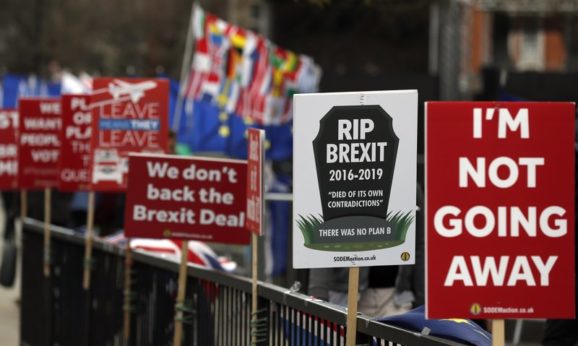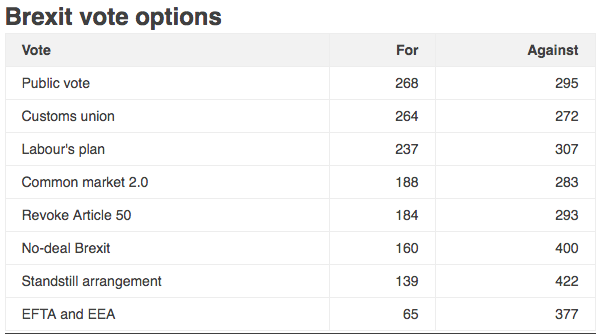
LONDON—As the sun broke through the few scattered clouds this morning, the people of Britain woke up to Brexit day…or at least what was supposed to be the U.K.’s official withdrawal date from the European Union after 46 years of membership.
Instead, the island is shrouded in uncertainty with a lame duck prime minister shuffling toward her own exit from power at the same that she has failed to deliver her country’s exit from the EU. A day three years in the making, after Britain voted to leave in June 2016, has now come, but lawmakers here still have no clear path forward on when, or even if, the country will leave the EU.
After two failed attempts to push her “Plan B” Brexit deal through, British Prime Minister Theresa May, after offering to throw herself upon Brexit’s proverbial sword—a move that failed, again put her withdrawal agreement up for a vote today in the House of Commons.
In a tactical move, to get around Speaker John Bercow’s use of a 400-year old parliamentary rule, during last night’s Brexit debates, the government announced it would only ask Members of Parliament to vote on the 585-page withdrawal agreement, and not on the political declaration outlining the terms of future U.K./EU economic relationships. Labour Party leader Jeremy Corbyn said the severing of the political declaration made the deal a “blindfold Brexit,” but the move worked to overcome the procedural hurdle. Bercow announced late Thursday that the main part of May’s Brexit deal would be allowed a third vote because, “In short, the motion is new and substantially different.”

But today, at 2:42 p.m. GMT (9:42 a.m. CST), MPs voted 344 to 286 to reject, for a third time, May’s negotiated withdrawal deal. The majority of 58 included members of the Labour Party and all 10 members from Northern Ireland’s right-wing Democratic Unionist Party.
The DUP’s lack of support for May’s deal was a blow to her leadership of the minority government and further shows the distrust Northern Irish lawmakers have in her ability to renegotiate the Irish backstop—an issue which they fear would see Northern Ireland effectively cut off from Britain and bound to the Republic of Ireland through the EU customs union’s rules and regulations.
Immediately following the vote, Corbyn took the floor, saying: “This is now the third time that the Prime Minister’s deal has been rejected. When it was defeated the first time the Prime Minister, said: ‘It is clear that this House does not support the deal.’ Does she now finally accept that the House does not support the deal?
“On Monday, this House has the chance, and I say to all members, the responsibility, to find a majority for a better deal for all the people of this country,” he continued, “so that we can decide the future of this country through a general election.”
Corbyn, along with members of May’s own Conservative Party, are renewing calls that May step down, “so a new leader can deliver an agreement which will be passed by parliament.”
Speaking to MPs afterwards, May said, “The implications of the House’s decision are grave…. I fear we are reaching the limits of this process.”
Today was one of the most crucial days for Brexit. If May had won enough support for her Brexit deal and it passed, then the U.K. would have had until May 22 to figure out how to leave in an orderly fashion.
With the deal’s defeat, the U.K will now have to decide whether to leave with no deal April 12 or to delay Brexit for several months, or possibly even years.
As vote results hit the newswires, EU Council President Donald Tusk called for an emergency EU27 summit to discuss next steps.
A commission spokesman said: “The commission regrets the negative vote in the House of Commons today,” saying it’s up to the U.K. government to indicate the way forward. A ‘no-deal’ scenario on 12 April is now a likely scenario. The EU has been preparing for this since December 2017 and is now fully prepared for a ‘no-deal’ scenario at midnight on 12 April,” they continued, “The EU will remain united.”
In Germany, the EU’s biggest and most dominant economy, the head of an influential association of capitalists says it’s time to start preparing for what he called “the worst.”
Eric Schweitzer, head of the Association of German Chambers of Commerce and Industry, described Britain’s failed vote by remarking that “the chaos is absolute.”
German companies, Schweitzer says, are furious over the economic uncertainty they now face. “There’s a threat in just a few days of a substantial Brexit bureaucracy and the demolition of supply chains involving the United Kingdom,” which he claimed could cost his association’s members “many billions of euros each year in tariffs.”
Financial markets are responding with a sell-off of the British pound. After May lost the vote, the pound’s value plunged as currency traders feared severe trade disruptions if no decision is made soon. One market analyst told the Associated Press that the country was “sleepwalking” toward a crash.
Unable to find consensus earlier this week

The latest failed vote caps a week in which MPs were unable to reach consensus on anything at all. After Parliament took over control of the Brexit Process Monday from the Prime Minister, and hours after May pledged to step down if her deal—which was never put up for a vote—passed Wednesday, MPs voted on a series of alternative Brexit options, including a customs union with the EU, a second public vote, and the Labour Party’s alternative Brexit plan.
The public watched as none of the eight proposed alternatives passed—even the Speaker had to break it all down for those watching in the public gallery.
The proposal that was closest in passing was the cross-party plan allowing the U.K. to join a new customs union with the EU to ensure tariff-free trade after the withdrawal.
Labour’s plan, including close alignment with the EU single market, was defeated 307 votes to 237 votes.
What comes next?
— More Brexit indicative votes: MPs are scheduled to hold another series of votes in a bid to find a majority consensus out of the Brexit impasse.
— No Deal: A crash out of the EU would occur April 12, if no other alternative is found. If May’s deal doesn’t pass today, we can expect more indicative votes on Brexit’s next steps Monday.
— No Brexit: Article 50, the part of the EU treaty concerned with ending membership, could still be canceled.
— Other less likely options: A second public vote on Brexit, a general election, or completely starting over Brexit negotiations from scratch.
Outside the Houses of Parliament, traffic has come to a halt. Pro-Brexit activists have taken over the streets chanting, “We shall not be moved” and “Leave means leave.” A blue and gold star EU flag waves high above the noise. People on both sides of the debate are angry and feel betrayed.
And with no end in sight, the possibility of a no-deal exit is becoming a very likely scenario, which is leaving many wondering, fearfully, “How do we move forward from this?”
Theresa May will be asking the same question as she finds herself returning to Brussels before April 12 to ask for a longer delay, adding the scheduled EU Parliament elections in May to the Brexit mix, or accepting a no-deal Brexit.
People’s World correspondent Al Neal’s earlier Brexit coverage from London and Brussels is available here.










